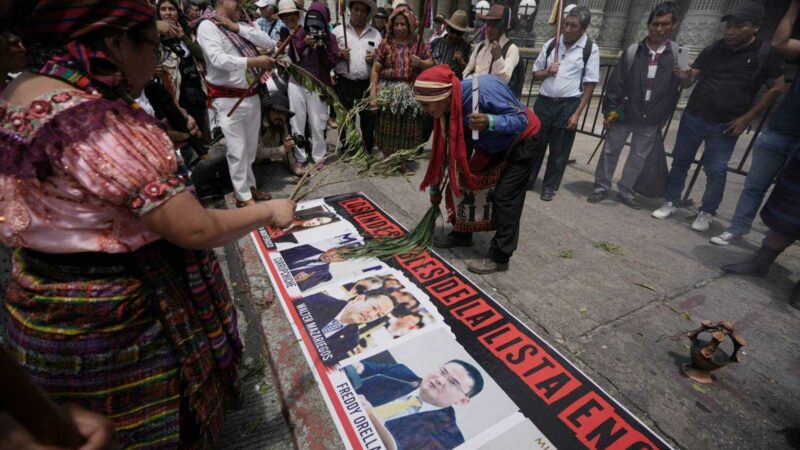Indigenous authorities from different communities have symbolically applied Xik’ay, or ancestral Mayan justice, to officials considered corrupt, among them Attorney General Consuelo Porras, the head of the Special Prosecutor’s Office against Impunity (FECI) Rafael Curruchiche, and Judge Fredy Orellana.
On August 20, 2023, sociologist and ex-diplomat Bernardo Arévalo of the progressive Movimiento Semilla party won the Guatemalan presidency by a wide margin, marking the beginning of a new era in a country that has lately been characterized by democratic backsliding and attacks against critical voices.
However, his party is in the crosshairs of the Public Prosecutor’s Office, which is investigating potential irregularities in the gathering of the signatures necessary for the formation of Movimiento Semilla several years ago. Both the prosecutor in charge of the investigation, Rafael Curruchiche, and the judge who ordered the suspension, Fredy Orellana, are on a list of corrupt actors compiled by the United States. Guatemala’s electoral authorities temporarily blocked Semilla’s suspension, but Arévalo has denounced ongoing attempts to prevent him from assuming his mandate.
For many Guatemalans, these are unwarranted attacks against the president-elect and his party. With a ceremony performed before the Supreme Electoral Tribunal (TSE), the Indigenous authorities performed this act, under the energies of Jun T’zi, an appropriate day in the Indigenous cosmovision for the application of Mayan justice to the operators of justice, public servants, and officials who, in their opinion, have been responsible for consolidating corruption in Guatemala.
In Guatemala, about 40 percent of the population identifies as Indigenous, composed of 23 different ethnicities. Through Indigenous movements and organizations, they have sought greater political representation and the promotion of their interests in a context in which they have historically faced socioeconomic challenges and discrimination. One Indigenous leader, Thelma Cabrera, tried to seek the presidency in these elections, but a court banned her candidacy, together with other progressive candidates.
Sebastiana Par, an ancestral authority of the Maya K’iche’, indicated that in her community, when a person steals a chicken or an ear of corn, they face justice. “That’s why we are calling on all authorities on the national level to also apply justice, not just to people who steal corn, but to these corrupt politicians who are robbing the country of its life, robbing the next generations of their future,” she said.


